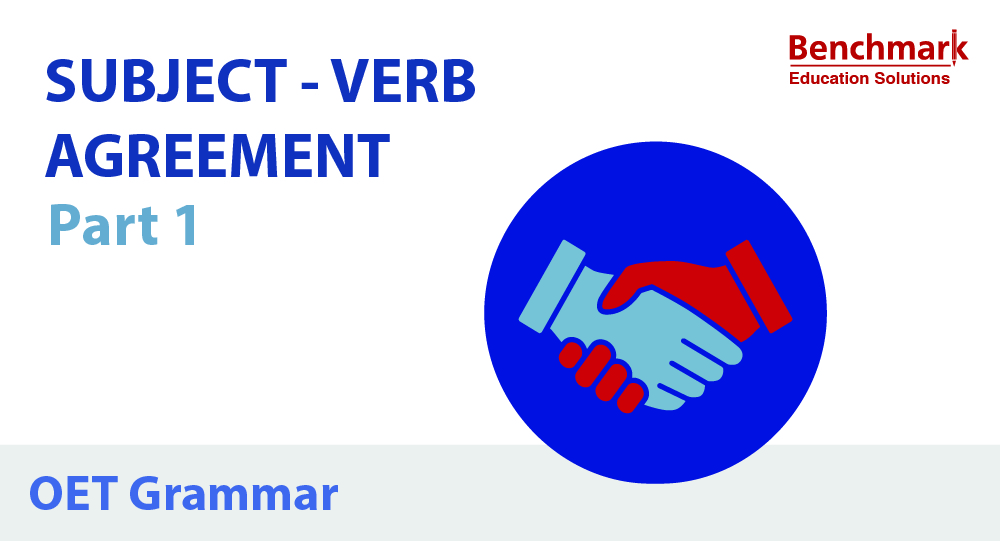OET Writing Tips: Subject-Verb Agreement [Part 1]
- 8 Comments


One of the most common mistakes that OET writing candidates make – as well as candidates for other English exams, such as TOEFL, PTE and IELTS – is called subject-verb disagreement. You may have heard of it from a teacher or in an English language textbook. This is because it’s quite a common problem, and people often want to solve it.
Table of Contents
But what does it mean?
Essentially, subject-verb agreement means getting the subject of a sentence to agree with the verb. This requires putting the verb into the correct form to match the subject, which means thinking about numbers. In other words, is the subject singular or plural? Is there one of something or more than one?
1. Present Simple
Let’s look at the following passage:
- The doctor recommend keeping the patient under observation.
What is the problem here?
The problem is that the subject of the sentence (doctor) is in a singular form while the verb (recommend) is in a form that would match with a plural subject. This is what we call subject-verb disagreement. We could fix this error in one of two ways, depending on the reality of the situation:
- The doctor recommends keeping the patient under observation.
- The doctors recommend keeping the patient under observation.
You can see that in the first sentence, the singular subject (doctor) matches well with the singular form verb (recommends) while in the second sentence the plural subject (doctors) matches well with the plural form verb (recommend). Now that the subjects and verbs align perfectly, this is called subject-verb agreement.
2. Past Simple
This is something that you need to take into consideration while writing in the present simple tense, but in the past simple tense it is often not necessary to worry because the verb ending will be the same regardless of whether the subject is singular or plural. We can see in these two examples:
- The cardiologist spoke with the head nurse.
- The cardiologists spoke with the head nurse.
In this case, the subject matches perfectly with the verb regardless of whether it is singular or plural.
3. Some More Examples of Subject-Verb Agreement
If the tense involves auxiliary verbs (as all the tenses except for the ones above do), then the auxiliary verb may need to change form in order to match with the subject. Let’s take the present continuous for example.
- The patients is undergoing a new type of therapy.
Here, we can see that the problem is once again a subject disagreeing with a verb. However, it is not the main verb (undergoing) that is incorrect. In this instance, it is the auxiliary verb (is) that has not matched well with the subject. This could again be fixed in one of two possible ways:
- The patients are undergoing a new type of therapy.
- The patient is undergoing a new type of therapy.
Of course, it is extremely important to note the difference in meaning between these two changes. Although both express correct grammar now, the actual number of patients has changed. It is essential in OET to be factually correct, and here we can see the intersection of facts and grammar.
For example, in the case of indefinite pronouns (either, one, neither, someone, somebody, anyone,no one,or nobody) you should use the singular verb form.
- Someone (singular) needs to attend to the patient during her hospital stay.
Some, all, most, or any are called quantifiers and these can be singular or plural. You need to check if the noun is singular or plural.
- Some of the medicines (plural) were not available at the pharmacy, so an alternative formula was suggested to the patient
- One of the medicines (one medicine) was not available at the pharmacy, so an alternative was suggested to the patient.
In case of correlative conjunctions (either …or /neither…..nor/ not only……but also), verb agrees to the subject nearest to it.
- Neither the patient nor her daughter (singular) agrees to the surgery.
- Neither the patients nor her daughters (plural) agree to the surgery.
In the case of ‘there is’ and ‘there are’, always look for the noun that follows. For example:
- There is a complication (singular) in performing this surgery.
- There are complications (plural) in performing this surgery.
4. Grammar for OET Writing
OET grammar accuracy is an essential part of writing assessment criteria among other descriptors for ‘Language’ with maximum 7 points. So, if your grammar is good, there are more chances that your overall score in the OET writing subtest will be 350 or above.
Subject-verb agreement is important in English and any native speaker will immediately recognize that a problem has occurred when reading a piece of writing that includes this error. As such, an essential OET writing tip is to work on improving your recognition of these errors and then work to remove them from your writing.
Just remember that although it can be easy to spot a simple mistake in subject-verb agreement, longer sentences bring far greater challenges, and you have to look harder to spot the errors. To do this successfully, you can attempt to locate the verb, ask what is doing that verb, and then make sure that the subject matches up perfectly to create agreement. Just take a look at this example:
- It is abundantly clear that the medication, which was prescribed by the patient’s former doctors, are not working.
So what is the problem in this sentence?
The problem is the verb “are” near the end of the sentence. It does not agree with its subject, “medication.” A candidate might make this error due to the noun nearest the verb (doctors) being in plural form. However, that noun (doctors) was not the subject of this clause. Even though there is a clause in between the subject and verb, it is still essential that they agree, and so candidates should take particular care to spot this sort of error and correct it before finalizing their OET writing paper.
5. Grammar for OET Speaking
Accuracy for grammar is equally important in the OET Speaking subtest. The assessors assess your performance in role-plays for range and accuracy in ‘Resources of grammar and expression’ for ‘Linguistic Criteria’. So, subject-verb agreement is an important grammatical concept to produce meaningful utterances and achieve high scores in the OET test.













Very useful kesson! Your effort is much appreciated! Will be eagerly waiting for the next one!
very usefull topics, thank you for your free lessons.
I am new to this session
Thanks for your helpful lessons regarding OET
This material is opening my mind , thank you so much team
Dear Benchmark Team,
I really appreciate your very helpful guidance that you send them to us.
They are so nourishing.
Warm regards
Thank you so much for the tips given. They are, and indeed will be so helpful.
Thank you bench mark team for the educative material that y always give us